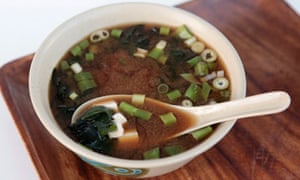埔捷運站1號出口 旁邊7-11巷子進入20公尺 看到夏朵美髮左轉 PM 7:00-9:30
琉球食物 活到100歲
The Okinawa diet – could it help you live to 100?
Michael Booth theguardian
Can you eat your way to a century? I am not referring to test cricketers, I'm talking about the Japanese diet. Or the Sardinian diet. Or the Ikarian diet. Or any one of half a dozen regional, usually traditional, ways of eating that have been credited with keeping an improbable proportion of their populations alive beyond the age of 100.
Last week, the oldest man ever on record, Jiroemon Kimura, from Kyotango near Kyoto, passed away at the age of 116. His death, and the fact that the new record holder, 115-year-old Misao Okawa, is from Osaka, reminded us that the Japanese know a trick or two when it comes to living beyond 100. According to the UN they have the greatest proportion of centenarians in the world – and a great deal of that knowhow concerns diet.
I have long taken an interest in how I might eat myself to old age. I visited the southern Japanese Okinawa islands whose population is said to include the largest proportion of centenarians in the country and met with some of them in what is supposedly the village with the oldest demographic in the world, Ogimi, little more than a dirt street lined with small houses, home to more than a dozen centenarians. Old folk tended vegetable patches or sat on porches watching a funeral procession go by. My family and I dined on rice and tofu, bamboo shoots, seaweed, pickles, small cubes of braised pork belly and a little cake at the local "longevity cafe" beneath flowering dragon fruit plants. Butterflies the size of dinner plates fluttered by and my youngest son asked if there was a KFC.
The next day I interviewed American gerontologist, Dr Craig Willcox, who has spent many years investigating Okinawan longevity and co-wrote a book, The Okinawa Program, outlining his findings (recommending that we "Eat as low down the food chain as possible" long before Michael Pollan's similarly veg-centric entreaty).
Willcox summarised the benefits of the local diet: "The Okinawans have a low risk of arteriosclerosis and stomach cancer, a very low risk of hormone-dependent cancers, such as breast and prostate cancer. They eat three servings of fish a week, on average ... plenty of whole grains, vegetables and soy products too, more tofu and more konbu seaweed than anyone else in the world, as well as squid and octopus, which are rich in taurine – that could lower cholesterol and blood pressure."
Okinawa's indigenous vegetables were particularly interesting: their purple sweet potatoes are rich in flavonoids, carotenoids, vitamin E and lycopene, and the local bitter cucumbers, or "goya", have been shown to lower blood sugar in diabetics. Like most of us, I am familiar with mainstream dietary advice – eat less sugar, salt and saturated fat, cut down on the cronuts and so on – but I much prefer the idea of discovering little-known shortcuts to longevity; I'm more of a "silver bullet" kind of guy. With this in mind, over a lunch of traditional goya chanpuru – bitter cucumber, stir-fried with tofu, egg and pork – in a restaurant that was little more than a tumbledown hut close to his campus, I asked Willcox which elements of the Okinawan diet he had introduced to his life. Turmeric and jasmine tea, he said; both potentially ward off cancer. Needless to say, both now feature in my morning ritual.
情商
Skillful Ways You Can Learn To Enhance Your Emotional Intelligence
Katherine Eion
Recognize and Manage Stress
There is no doubt that life is stressful. How you manage stress has a direct impact on emotional intelligence. Enhancing time-management skills may be one area where stress can be reduced. Prioritize tasks and learn how to politely refuse requests that are time-consuming but not beneficial. For example, take time to help out a friend but leave the dishes for later. Make and act on those decisions that are best for you. Don’t spend time worrying about what others would do or what others think or believe about you. Take a walk to soothe and clear a mind cluttered with emotions.
Develop An Open Mind
Learn to at least listen to the other side of an argument. Listening does not necessarily mean agreement. Be eager to learn and enhance your own natural intellectual curiosity. These tips help you to grow emotionally and intellectually. A means to understanding and getting along with others is in refusing to always be right; after all, no one is ever right all the time. You will also develop a means of dealing with conflict with confidence and poise. Frequently listen to debates, political and otherwise, on television and radio.
Develop Extrovert and Empathetic Tendencies
Empathy is the ability to understand another’s reactions and emotions in a given situation. This important skill is developed through thinking about how others are being treated. Refuse to be isolated. Volunteering skills and getting to know people can help you develop extroversion. Through getting involved with others, you become a person who is selfless and helpful. Development of these tendencies make you a better person, more skilled toward benefiting and helping others. This does not mean allowing others to simply use or walk all over you. Rather, you become an individual willing to set boundaries and happily engage in social interactions.
Be Analytical and Responsive
Think about how a decision will impact your life. Completely weigh options before acting. Be pro-active in decision-making. This is where a creative and imaginative mind serve you well. Consider the impact of hypothetical situations, such as changing jobs, getting involved in a new relationship, or moving. The consideration of a pretend scenario impacts the way a life changing situation can and will be addressed. Form goals, and write down short and long-term goals and the steps toward their ultimate achievement.













0 意見:
張貼留言